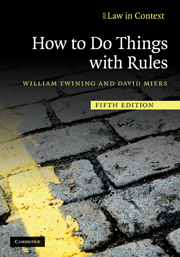Book contents
- Frontmatter
- Contents
- Preface
- Online appendices
- Acknowledgements
- Abbreviations
- Table of statutes and legislative instruments
- Table of cases
- Part I
- Part II Reading, using and interpreting rules in general
- Part III Reading law: reading, using and interpreting legislation and cases
- 6 Routine and problematic readings
- 7 Legislation
- 8 Interpreting legislation
- 9 Reading cases
- 10 The European dimension
- 11 Rules, reasoning and interpretation
- Part IV
- Index
- Resources on the web
- References
6 - Routine and problematic readings
Published online by Cambridge University Press: 05 June 2012
- Frontmatter
- Contents
- Preface
- Online appendices
- Acknowledgements
- Abbreviations
- Table of statutes and legislative instruments
- Table of cases
- Part I
- Part II Reading, using and interpreting rules in general
- Part III Reading law: reading, using and interpreting legislation and cases
- 6 Routine and problematic readings
- 7 Legislation
- 8 Interpreting legislation
- 9 Reading cases
- 10 The European dimension
- 11 Rules, reasoning and interpretation
- Part IV
- Index
- Resources on the web
- References
Summary
Routine readings
In this Part of the book we apply the lessons about rules in general that were explored in Part II to the task of reading, interpreting and using the two principal sources of law in the United Kingdom. They are the decisions of the superior courts and the legislative rules enacted in the Westminster Parliament and by the European Union. A central theme is that those who seek to use or rely on rules of law derived from these sources are able to do so, as a matter of routine, without difficulty. Much of the activity of using law is unproblematic in the sense that only exceptionally are issues raised concerning its scope, meanings or application. This is, for example, true for those employed in the regulated industries such as gas, water, electricity, transport and financial services, in executive agencies, local government or other public sector bodies or in private commerce, whose job it is to advise on the application of the law to their activities. It is also so for the solicitor advising private individuals about the buying and selling of their houses, the making or interpretation of their wills, or the myriad of other transactions or events affecting their lives which have a legal dimension.
In saying that in the vast majority of instances the reader of these sources of law is unlikely to be in doubt about the scope or application of a rule of law, we are not saying that the reading of that rule of law is necessarily easy.
Information
- Type
- Chapter
- Information
- How to Do Things with Rules , pp. 175 - 192Publisher: Cambridge University PressPrint publication year: 2010
